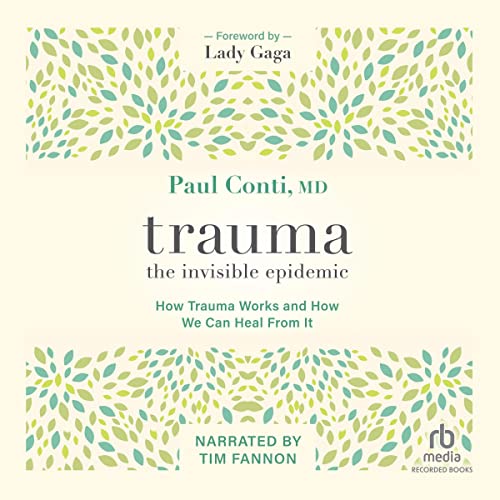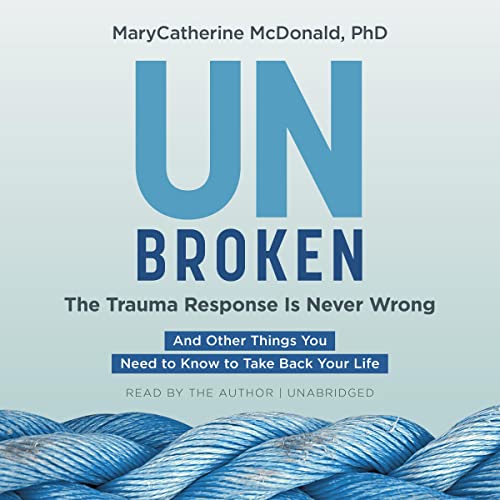
 Audible sample
Audible sample  Playing...
Playing... 
 Paused
Paused  Enjoy this audiobook free + more
Enjoy this audiobook free + more
Free title with your free trial!
$0.00$0.00
- Click above to get a preview of our newest plan - unlimited listening to select audiobooks, Audible Originals, and podcasts.
- You will get an email reminder before your trial ends.
- $7.95$7.95 a month after 30 days. Cancel online anytime.
Buy
-13% $13.99$13.99
Trauma: The Invisible Epidemic: How Trauma Works and How We Can Heal from It
 Audible Audiobook
– Unabridged
Audible Audiobook
– Unabridged
Join Dr. Paul Conti for a journey toward understanding, active treatment, and societal prevention of trauma.
Imagine, if you will, a disease - one that has only subtle outward symptoms but can hijack your entire body without notice; one that transfers easily between parent and child; one that can last a lifetime if untreated. According to Dr. Paul Conti, this is exactly how society should conceptualize trauma: as an out-of-control epidemic with a potentially fatal prognosis.
In Trauma: The Invisible Epidemic, Dr. Conti examines the most recent research, clinical best practices, and dozens of real-life stories to present a deeper, richer, and more urgent view of trauma. Not only does Dr. Conti explain how trauma affects the body and mind, he also demonstrates that trauma is transmissible among close family and friends, as well as across generations and within vast demographic groups.
With all this in mind, Trauma: The Invisible Epidemic proposes a course of treatment for the seemingly untreatable. Here, Dr. Conti traces a step-by-step series of concrete changes that we can make both as individuals and as a society to alleviate trauma’s effects and prevent further traumatization in the future.
It’s only when we understand how a disease spreads and is sustained that we are able to create its ultimate cure. With Trauma: The Invisible Epidemic, Dr. Conti reveals that what we once considered a lifelong, unbeatable mental illness is both treatable and preventable.
- Listening Length6 hours and 9 minutes
- Audible release dateOctober 5, 2021
- LanguageEnglish
- ASINB0971QV725
- VersionUnabridged
- Program TypeAudiobook
 Read & Listen
Read & Listen
Switch back and forth between reading the Kindle book and listening to Audible audiobook.Add the audiobook for a reduced price of $6.36 after you get the Kindle book as part of your Kindle Unlimited subscription.
People who viewed this also viewed
- Unbroken: The Trauma Response Is Never Wrong: And Other Things You Need to Know to Take Back Your Life
 Audible Audiobook
Audible Audiobook - Audible Audiobook
- Audible Audiobook
- Audible Audiobook
- Audible Audiobook
People who bought this also bought
- Audible Audiobook
- Audible Audiobook
- Audible Audiobook
- Opening Up by Writing It Down, Third Edition: How Expressive Writing Improves Health and Eases Emotional Pain
 Audible Audiobook
Audible Audiobook - Audible Audiobook
Related to this topic
- Audible Audiobook
- Audible Audiobook
- Audible Audiobook
- Audible Audiobook
- Rewire: Change Your Brain to Break Bad Habits, Overcome Addictions, Conquer Self-Destructive Behavior
 Audible Audiobook
Audible Audiobook
Product details
| Listening Length | 6 hours and 9 minutes |
|---|---|
| Author | Paul Conti |
| Narrator | Tim Fannon |
| Whispersync for Voice | Ready |
| Audible.com Release Date | October 05, 2021 |
| Publisher | Recorded Books |
| Program Type | Audiobook |
| Version | Unabridged |
| Language | English |
| ASIN | B0971QV725 |
| Best Sellers Rank | #40,518 in Audible Books & Originals (See Top 100 in Audible Books & Originals) #75 in PTSD #108 in Medical Neuropsychology #429 in Popular Psychology Pathologies |
Customer reviews
Customer Reviews, including Product Star Ratings help customers to learn more about the product and decide whether it is the right product for them.
To calculate the overall star rating and percentage breakdown by star, we don’t use a simple average. Instead, our system considers things like how recent a review is and if the reviewer bought the item on Amazon. It also analyzed reviews to verify trustworthiness.
Learn more how customers reviews work on AmazonReviews with images
-
Top reviews
Top reviews from the United States
There was a problem filtering reviews right now. Please try again later.
Its medicalized methods aren't sustainable either. They can be stigmatizing and traumatizing, a dehumanizing process for both patient and practitioner in which mental and emotional states are taken as signifiers of something “wrong” that needs to be “cured,” where diagnostic language objectifies the patient and asserts practitioner authority.
Treatment also routinely serves as a form of punishment, and several methods deserve critique as deliberate or unconscious strategies to press individuals to conform, for their lack of attention to developmental and relational or physiological needs. The therapist's office can also become the holding tank for patients with treatment-resistant physical suffering who have been slapped with a psychiatric diagnosis instead…
From a bird’s eye view, the system of care can look like a labyrinth of chutes by which individuals can effortlessly internalize the failures, disconnects, ills and evils happening around them, and by which they can further isolate and numb or fail to get traction in their lives. With pharmaceuticals facilitating throughput and the management of heavy caseloads, the hatch on the deeper realities and festering wounds gets heavier and heavier to lift.
Rather than railing against the system, Conti offers a model for stepping in as individuals to right the ship—to set a course for honoring the human condition, where both healthy boundaries and relational exchange can coexist.
He has divested himself of the hierarchical language and positionality of the medical field, and his own subjectivity is woven throughout the book. Writing as both human and healer, he shines a soft and gentle light into recesses of shame and traces suffering within an expanded context of culture, community, family history, economics, national politics, historical events, and inevitably occurring life experiences. Even as the failures of the mental health care complex come into exponentially greater dimension through his lens, he holds steady, delivering the wisdom of experience and a well spring of humanity. There’s no splitting or blaming, but an invitation, a call to provide care and a demonstration of the breadth of the need.
If you are in deep distress, this might not be the book to start with but it could serve as an essential corollary and supplement to your healing process. Going deep into the nature of one’s own suffering requires multiple layers of support, and what is needed for the nervous system doesn’t come solely in the cognitive and solitary space of reading a book. But for those situations when we are in a position to provide care, this is a critically important book to take to heart. It is likewise a great model if you are committed to sustainability, integration or systems change.
“Trauma: The invisible Epidemic” to all my patients. and I’ll be re-reading it many times.
Also I was moved by some of the real life experiences told in the book.
It is one of the better books out there.
Top reviews from other countries
Reviewed in Canada on January 18, 2023
























